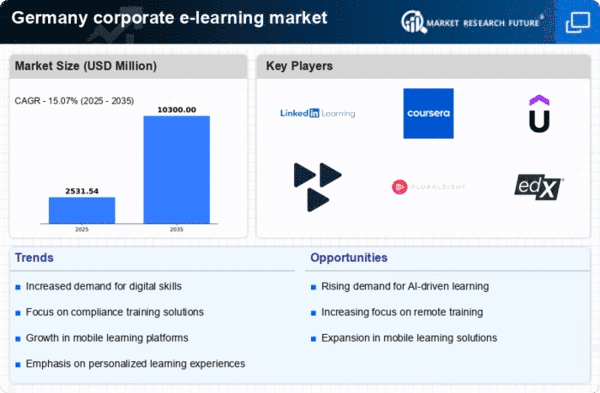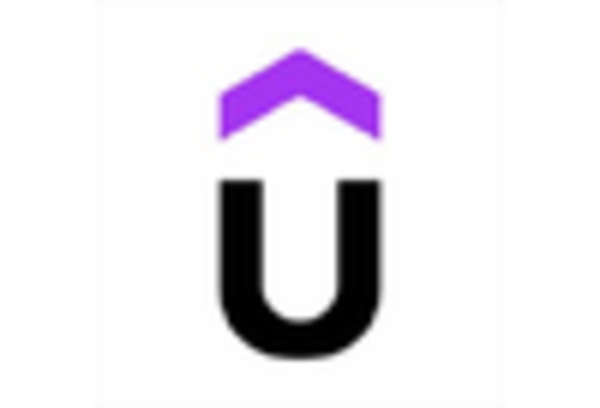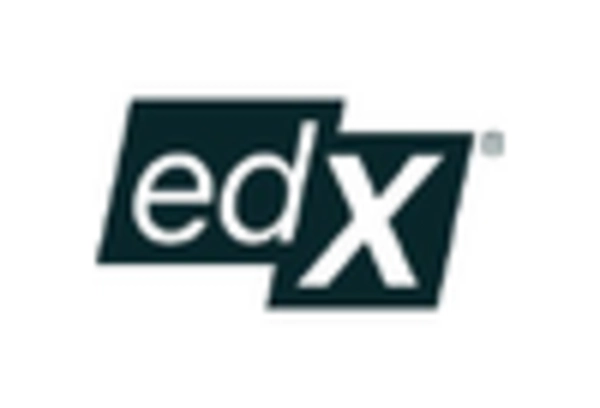Shift Towards Remote Work Culture
The corporate e-learning market in Germany is benefiting from the ongoing shift towards remote work culture. As organizations adapt to flexible work arrangements, the need for effective online training solutions has become paramount. E-learning platforms provide a scalable and efficient way to train employees who may be dispersed across various locations. This trend is reflected in the increasing investment in digital learning tools, with companies allocating approximately 30% of their training budgets to e-learning initiatives. The ability to deliver consistent training across remote teams is likely to enhance workforce productivity and cohesion, thereby driving the corporate e-learning market forward.
Regulatory Compliance and Training Needs
In Germany, regulatory compliance is a critical driver for the corporate e-learning market. Organizations are mandated to provide training that adheres to various legal and industry standards. This necessity compels companies to invest in e-learning solutions that can efficiently deliver compliance training. The corporate e-learning market is thus positioned to grow as businesses seek to mitigate risks associated with non-compliance. For instance, sectors such as finance and healthcare require ongoing training to meet stringent regulations. As a result, the demand for tailored e-learning programs that address these compliance requirements is likely to increase, further propelling the market's growth.
Technological Advancements in E-Learning
The corporate e-learning market in Germany is experiencing a surge due to rapid technological advancements. Innovations such as virtual reality (VR) and augmented reality (AR) are transforming traditional training methods into immersive learning experiences. This shift is likely to enhance engagement and retention rates among employees. Furthermore, the integration of mobile learning platforms allows for flexibility, enabling employees to access training materials anytime and anywhere. According to recent data, the e-learning market in Germany is projected to grow at a CAGR of 10.5% from 2025 to 2030, indicating a robust demand for advanced learning solutions. As organizations increasingly adopt these technologies, the corporate e-learning market is expected to expand significantly, catering to diverse learning needs and preferences.
Cost-Effectiveness of E-Learning Solutions
The corporate e-learning market in Germany is increasingly appealing due to the cost-effectiveness of e-learning solutions. Traditional training methods often incur high costs related to travel, venue hire, and materials. In contrast, e-learning platforms significantly reduce these expenses, allowing organizations to allocate resources more efficiently. Studies suggest that companies can save up to 70% on training costs by implementing e-learning programs. This financial advantage is particularly attractive for small and medium-sized enterprises (SMEs) that may have limited training budgets. As organizations seek to optimize their training expenditures, the corporate e-learning market is likely to witness sustained growth.
Focus on Employee Development and Retention
Employee development is a key focus for organizations in Germany, driving the corporate e-learning market. Companies recognize that investing in employee training not only enhances skills but also improves retention rates. Research indicates that organizations that prioritize learning and development experience a 34% higher employee retention rate. This realization prompts businesses to adopt e-learning solutions that offer personalized learning paths and career development opportunities. By fostering a culture of continuous learning, companies can attract and retain top talent, thereby contributing to the growth of the corporate e-learning market.
















